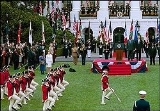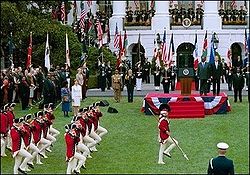
State visit
Encyclopedia

Head of State
A head of state is the individual that serves as the chief public representative of a monarchy, republic, federation, commonwealth or other kind of state. His or her role generally includes legitimizing the state and exercising the political powers, functions, and duties granted to the head of...
to another nation, at the invitation of that nation's head of state. State visits are the highest form of diplomatic contact between two nations, and are marked by ceremonial pomp and diplomatic protocol. In parliamentary democracies
Parliamentary system
A parliamentary system is a system of government in which the ministers of the executive branch get their democratic legitimacy from the legislature and are accountable to that body, such that the executive and legislative branches are intertwined....
, heads of state may formally issue and accept invitations. However, they do so on the consent of their governments, who usually agree together on when the invitation is to be issued or accepted in advance.
State visits involve some or all the following components:
- A welcoming ceremony consisting of a review of military honor guardHonor guardAn honor guard, or ceremonial guard, is a ceremonial unit, usually military in nature and composed of volunteers who are carefully screened for their physical ability and dexterity...
s, parades, and the playing of national anthemNational anthemA national anthem is a generally patriotic musical composition that evokes and eulogizes the history, traditions and struggles of its people, recognized either by a nation's government as the official national song, or by convention through use by the people.- History :Anthems rose to prominence...
s by a military bandMilitary bandA military band originally was a group of personnel that performs musical duties for military functions, usually for the armed forces. A typical military band consists mostly of wind and percussion instruments. The conductor of a band commonly bears the title of Bandmaster or Director of Music...
. - A 21-gun salute21-gun saluteGun salutes are the firing of cannons or firearms as a military or naval honor.The custom stems from naval tradition, where a warship would fire its cannons harmlessly out to sea, until all ammunition was spent, to show that it was disarmed, signifying the lack of hostile intent...
fired for foreign heads of state and a 19-gun salute fired for foreign heads of government. - An exchange of gifts between the foreign head of state and the head of state from the nation hosting the state visit.
- State dinnerState dinnerA state dinner is a dinner or banquet paid by a government and hosted by a head of state in his or her official residence in order to renew and celebrate diplomatic ties between the host country and the country of a foreign head of state or head of government who was issued an invitation. In many...
s, either white tieWhite tieWhite tie is the most formal evening dress code in Western fashion. It is worn to ceremonial occasions such as state dinners in some countries, as well as to very formal balls and evening weddings...
or black tieBlack tieBlack tie is a dress code for evening events and social functions. For a man, the main component is a usually black jacket, known as a dinner jacket or tuxedo...
, hosted by a head of state, with the foreign head of state being the guest of honor. - A visit to a national legislatureLegislatureA legislature is a kind of deliberative assembly with the power to pass, amend, and repeal laws. The law created by a legislature is called legislation or statutory law. In addition to enacting laws, legislatures usually have exclusive authority to raise or lower taxes and adopt the budget and...
, often with a formal address by the foreign head of state being delivered to the legislative bodies assembled. - High-profile visits by foreign heads of state to national landmarkLandmarkThis is a list of landmarks around the world.Landmarks may be split into two categories - natural phenomena and man-made features, like buildings, bridges, statues, public squares and so forth...
s such as laying a wreath at a military shrine or cemeteryCemeteryA cemetery is a place in which dead bodies and cremated remains are buried. The term "cemetery" implies that the land is specifically designated as a burying ground. Cemeteries in the Western world are where the final ceremonies of death are observed...
. - Cultural events celebrating links between the two nations, which are held in conjunction with a state visit.
The foreign head of state is usually accompanied by a senior government minister, usually by a foreign minister
Foreign minister
A Minister of Foreign Affairs, or foreign minister, is a cabinet minister who helps form the foreign policy of a sovereign state. The foreign minister is often regarded as the most senior ministerial position below that of the head of government . It is often granted to the deputy prime minister in...
. Behind the diplomatic protocol, delegations made up from trade
Trade
Trade is the transfer of ownership of goods and services from one person or entity to another. Trade is sometimes loosely called commerce or financial transaction or barter. A network that allows trade is called a market. The original form of trade was barter, the direct exchange of goods and...
organizations also travel with the foreign head of state, offering an opportunity to network and develop economic, cultural, and social links with industry leaders in the nation being visited. At the end of a state visit, the foreign head of state traditionally issues a formal invitation to the head of state of the nation being visited who at another time in the future, would pay a reciprocal state visit.
While the costs of a state visit are usually borne by the treasury of the host country, most nations host fewer than ten state visits per year, with some as few as two. Most foreign heads of state will stay in the official residence
Official residence
An official residence is the residence at which heads of state, heads of government, gubernatorial or other senior figures officially reside...
of the head of state who is hosting the state visit, in a guest house reserved for foreign visitors, or in their own nation's embassy located in the foreign nation being visited.
State visits by well-known global leaders, like the President of the United States
President of the United States
The President of the United States of America is the head of state and head of government of the United States. The president leads the executive branch of the federal government and is the commander-in-chief of the United States Armed Forces....
, the Pope
Pope
The Pope is the Bishop of Rome, a position that makes him the leader of the worldwide Catholic Church . In the Catholic Church, the Pope is regarded as the successor of Saint Peter, the Apostle...
or Queen Elizabeth II (who heads 16 countries
Commonwealth Realm
A Commonwealth realm is a sovereign state within the Commonwealth of Nations that has Elizabeth II as its monarch and head of state. The sixteen current realms have a combined land area of 18.8 million km² , and a population of 134 million, of which all, except about two million, live in the six...
), often draw much publicity and large crowds.
See also
- List of Commonwealth visits made by Queen Elizabeth II
- List of international trips made by the President of the United States
- List of journeys of Pope Benedict XVI
- List of meetings between the President of the United States and the Pope
- List of pastoral visits of Pope John Paul II outside Italy
- List of pastoral visits of Pope Paul VI outside Italy
- List of international trips made by Benigno S. Aquino III
- List of state and official visits by Canada
- List of state visits made by King Carl XVI Gustaf of Sweden
- List of state visits made by King Haakon VII of Norway
- List of state visits made by King Harald V of Norway
- List of state visits made by King Olav V of Norway
- List of state visits made by President Cavaco Silva of Portugal
- List of state visits made by President Tarja Halonen of Finland
- List of state visits made by President Urho Kekkonen of Finland
- List of state visits made by Queen Elizabeth II
- Pope Benedict XVI's visit to the United KingdomPope Benedict XVI's visit to the United KingdomPope Benedict XVI's visit to the United Kingdom from 16 to 19 September 2010 was the first state visit by a pope to the United Kingdom...
- Pope Benedict XVI's visit to the United StatesPope Benedict XVI's visit to the United StatesPope Benedict XVI's visit to the United States took place from April 15, 2008 to April 20, 2008 and was his first visit to the United States. It was officially titled the "Apostolic Visit to the United States of America and to the Seat of the United Nations"...
- Queen Elizabeth II's visit to the Republic of IrelandQueen Elizabeth II's visit to the Republic of IrelandQueen Elizabeth II and the Duke of Edinburgh made a state visit to the Republic of Ireland from 17 May to 20 May 2011, at the invitation of the President of Ireland, Mary McAleese....
- United States presidential visits to AfricaUnited States presidential visits to AfricaThis article concerns trips of a sitting United States President to Sub-Saharan Africa. -Highlights:* The first presidential trip was an offshoot of the secretive World War II trip of President Franklin D. Roosevelt in 1943. The trip to Africa was a direct result of the technology of aircraft of...
- United States presidential visits to CanadaUnited States presidential visits to CanadaVisits by the President of the United States to Canada have been a part of Canada – United States relations since the early twentieth century....
- United States presidential visits to MexicoUnited States presidential visits to MexicoU.S. presidential visits to Mexico have been done by every president since World War II. President Taft also walked across the border in 1909, which was the first visit for any U.S. president; President Obama's first visit was the 30th for any U.S. president. The country was most visited by...
- United States presidential visits to United KingdomUnited States presidential visits to United KingdomThe United Kingdom is the most common international destination for a sitting United States president. This is partly because of the importance of London as a global city, the convenience of meeting in Bermuda, a British territory in the Western Hemisphere, the importance of the UK as a strategic...

